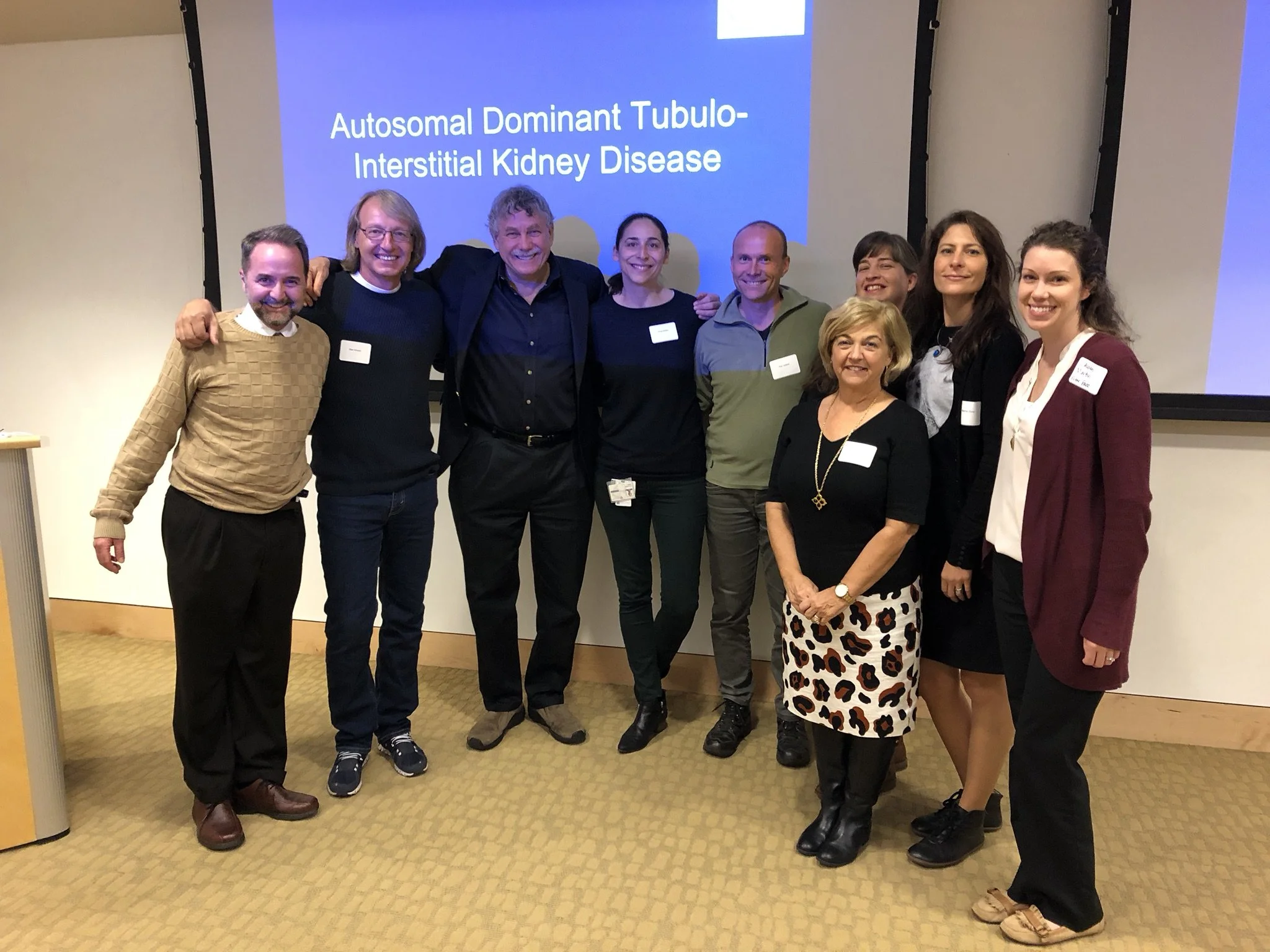Team History
In 1996, Dr. Anthony Bleyer was referred a family from the mountains of North Carolina that suffered from inherited kidney disease. Many relatives had slowly progressive kidney failure, ultimately requiring kidney transplant or dialysis, and some also suffered from gout. This condition was poorly understood at the time, with fewer than 30 diagnosed families in the United States. Although Dr. Bleyer was not a geneticist, he recognized that this large family with many affected members offered an opportunity to identify a genetic cause of this condition. He began collecting blood samples and enlisted the help of Dr. Thomas Hart, a geneticist at Wake Forest School of Medicine. Over several years, Dr. Hart performed extensive genetic analyses on samples gathered by Dr. Bleyer, and in 2001 he identified a mutation in the UMOD gene as the cause of this kidney disease. Dr. Bleyer then identified several other families with UMOD mutations. Drs. Bleyer and Hart submitted a manuscript to the Journal of Medical Genetics and continued to seek additional affected families. “We thought there would be about 25 families in the US with this disease,” Dr. Bleyer recalled.
Drs. Hart and Bleyer
Dr. Bleyer began to give lectures on ADTKD at medical schools like Johns Hopkins Hospital, Harvard Medical School, the University of North Carolina, Stanford Medical School, the University of Cyprus, and Charles University in Prague, as well as at American Society of Nephrology national meetings. These efforts helped identify more affected families.
A group of physicians and scientists coined the name “Autosomal Dominant Tubulointerstitial Kidney Disease” (ADTKD) in 2015 to describe this disorder. Its hallmarks are:
1) Children of an affected parent have a 50% chance of inheriting the condition.
2) Patients develop chronic kidney disease, usually leading to dialysis or transplantation between ages 20 and 80 (average age ~45 years).
3) Very little blood or protein in the urine.
As additional families without UMOD mutations surfaced, the genetic basis of this subtype remained elusive. In 2008, Dr. Bleyer began collaborating with Dr. Eric Lander, a leading international expert in genetics, at the Broad Institute of Harvard and MIT in Cambridge, MA. Using Dr. Bleyer’s samples, Lander’s team identified MUC1 mutations—an especially challenging discovery due to MUC1’s complex structure, which defies conventional sequencing. The Broad Institute offers a free MUC1 genetic test for all ADTKD families; Dr. Bleyer and his team collect and forward the samples to the Broad Institute, where they undergo genetic analysis. Dr. Anna Greka has become a key team member at the Broad Institute, working to develop therapies for these disorders.
Drs. Bleyer, Kmoch, Lander, and Greka and the Wake Forest Rare Inherited Kidney Disease Team
In 2009, Dr. Bleyer started collaborating with Dr. Stan Kmoch at Charles University in Prague. Dr. Kmoch had shown that REN (renin) gene mutations cause ADTKD and found a similar REN variant in families Dr. Bleyer was following. Their partnership expanded to uncover mutations in SEC61A1, NDUFAF6, and APOA4. Together, they have published over 70 papers on ADTKD genetics.
ADTKD—once thought to be rare—has been found to be the third most common inherited kidney disease in the US, affecting at least 20,000 individuals.
Drs. Kmoch and Bleyer
Over time, the Rare Inherited Kidney Disease Team at Wake Forest School of Medicine took shape with the mission “To help one patient, one family at a time.” Dr. Kendrah Kidd joined in 2012 to lead laboratory and registry development. Lead study coordinators Lauren Martin (2015) and Abby Taylor (2016) followed, along with laboratory scientist Antonio Sanchez and study coordinators Stephanie Cloud and Sharianna Vargas, who manage our longitudinal prospective study. Undergraduate interns Noah Crews and Thomas Pinder joined in 2025. The team collaborates closely with Dr. Stan Kmoch’s group at the Charles University in Prague, Dr. Greka’s laboratory at the Broad Institute, and Dr. Peter Conlon’s team at Beaumont Hospital in Ireland.
The Wake Forest Rare Inherited Kidney Disease Team
The Wake Forest Rare Inherited Kidney Disease Team has been referred more than 1,300 families and has identified over ten novel genetic causes of kidney disease, including UMOD in 318 families, MUC1 in 163, REN in 27, as well as other new genetic causes of kidney disease in 8 families, while also identifying known genetic causes of kidney disease in 135 families. The team’s primary goal is to identify genetic causes of kidney disease and develop effective treatments, with a particular focus on ADTKD-UMOD and ADTKD-MUC1, supported by a growing patient registry.
For information on testing, taking part in our research, getting answers to specific questions about ADTKD, or receiving updates:
contact kidney@wakehealth.edu
Per Dr. Bleyer: “Our work will always concentrate on helping each individual patient and family we see. We have a great team at Wake Forest and work closely with colleagues all over the world to further research in this area. Through our work with leading scientists, we have been able to help many families and look forward to helping more families in the future and identifying more treatments for ADTKD.”
Click here for a patient’s testimony.





